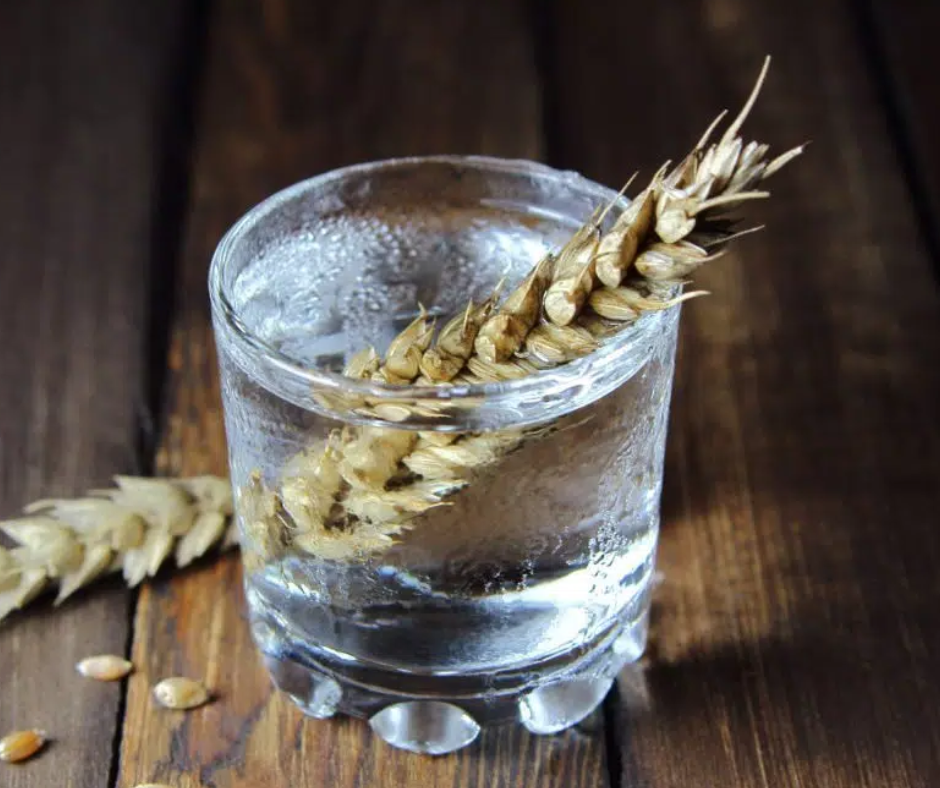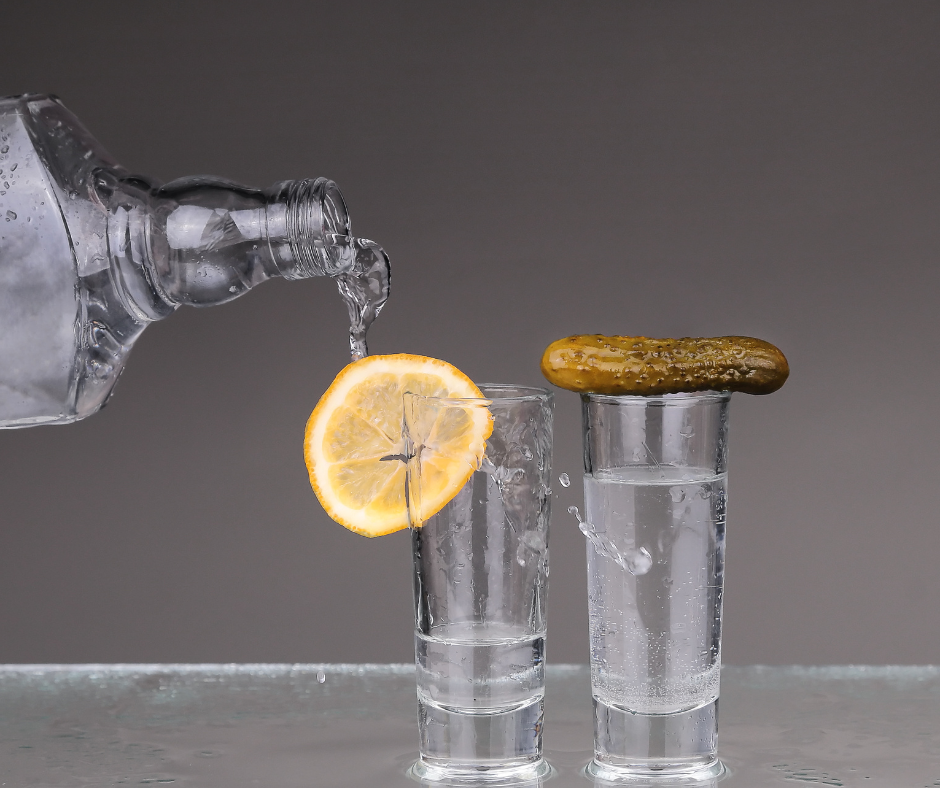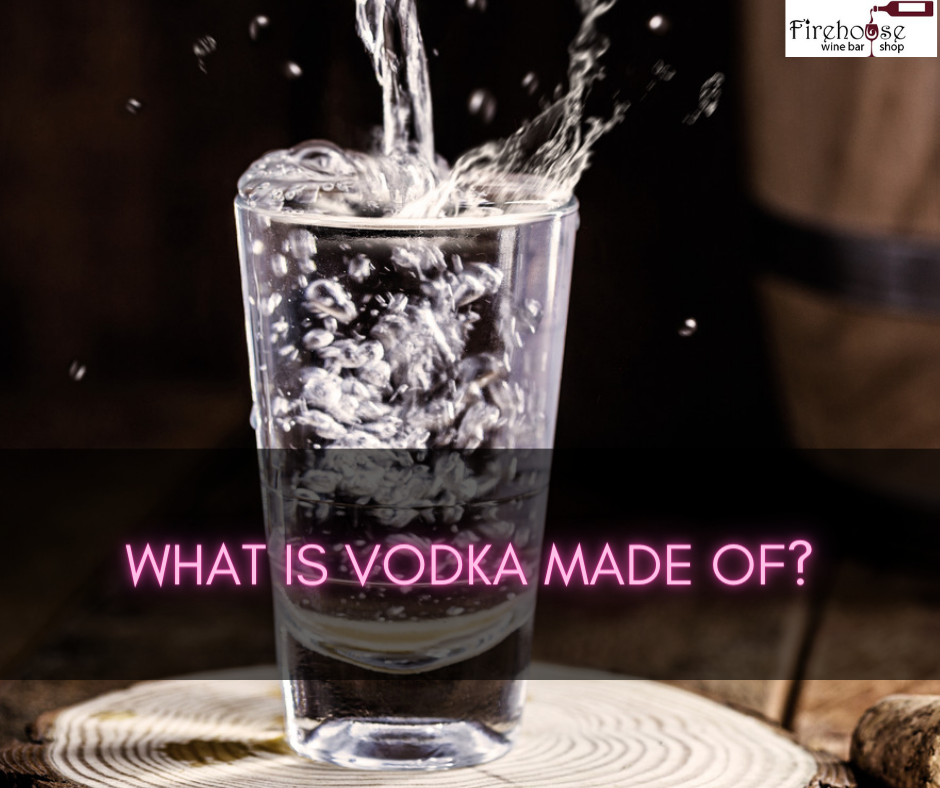Introduction
Vodka is a popular distilled liquor originating in Poland, Russia, and Sweden. It is composed primarily of water and ethanol, with occasional traces of impurities and flavorings. But What Is Vodka Made Of? Traditionally, vodka is made by distilling liquid from fermented cereal grains and potatoes, which was introduced to Europe in the 1700s. Over time, modern brands have also begun to use various base ingredients, such as corn, sugar cane, fruits, honey, and maple sap.
Overview Of Vodka And Its Popularity Worldwide
Vodka is a clear, colorless liquor typically consumed in cocktails or mixed drinks. It is a highly versatile spirit with many flavors and mixers. Vodka has gained immense popularity worldwide, with countries such as Russia, Poland, and Ukraine being some of the highest consumers per capita.
Vodka has been the most popular spirit in the United States for several decades. The country accounts for almost one-third of global vodka consumption. This demonstrates the scale of the spirit’s popularity and its ability to appeal to a wide range of tastes and palates.
The History And Origins Of Vodka
The origins of vodka can be traced back to the early 14th century when it was first distilled in Russia. The name “vodka” is derived from the Russian word “voda,” which means water. Initially, vodka was used for medicinal purposes and was not considered a recreational drink.
Over time, vodka became more commonly consumed in Russia and Poland. It was made from various ingredients, including wheat, rye, and potatoes. Vodka production became regulated and standardized in the 19th century, which helped improve its quality and reputation.
Today, vodka is enjoyed worldwide and produced in various countries, including Russia, Poland, Sweden, France, and the United States. The different varieties of vodka vary in taste and aroma, depending on the base ingredients used and the specific distillation process employed.

Definition Of Vodka
Vodka is a popular distilled liquor in Poland, Russia, and Sweden. It is a clear, colorless spirit composed mainly of water and ethanol, with occasional traces of impurities and flavorings. Traditionally, vodka distills liquid from fermented cereal grains and potatoes. Still, modern brands have also begun to use various base ingredients, such as corn, sugar cane, fruits, honey, and maple sap. Vodka is widely consumed in cocktails or mixed drinks and is a highly versatile spirit that can be combined with a wide range of flavors and mixers.
What Is Vodka Made Of And Its Main Ingredients
Vodka is a very popular distilled spirit that is enjoyed around the world. But what is vodka made of? The primary ingredients of vodka are water and ethanol. Traditional vodka production distills the liquid from fermented cereal grains and potatoes. These include wheat, sorghum, and rye, among others.
However, modern brands have expanded the range of base ingredients used to produce vodka. For instance, some popular brands use corn, sugar cane, fruits, honey, and maple sap. Essentially, anything converted to sugar from carbohydrates can make vodka. The ingredients used to produce vodka vary not only by country of origin but also by individual distillers.
Understanding The Distillation Process Of Vodka
Vodka production begins with the fermentation of the base ingredients to produce a mash. The mash is then subjected to a distillation process that involves heat and condensation. The resulting liquid is then filtered to remove impurities and add flavorings to create the desired taste. The distillation process for vodka is highly regulated, and specific rules and standards must be met to ensure the quality of the product.
The different varieties of vodka vary in taste and aroma, depending on the base ingredients used and the specific distillation process employed. Ultimately, the goal of the distillation process is to create a spirit that is smooth, neutral, and pure in flavor.
Origins Of Vodka
Where Did Vodka Come From?
Vodka is a distilled liquor enjoyed by many for hundreds of years. Its origins can be traced back to Poland, Russia, and Sweden. The name vodka comes from the Russian word voda, which means water.
The primary ingredients of vodka are water and ethanol, with occasional traces of impurities and flavorings. Traditionally, vodka distills liquid from fermented cereal grains and potatoes. However, modern brands have begun to use various base ingredients, such as corn, sugar cane, fruits, honey, and maple sap.
The Early History Of Vodka In Russia And Poland
In Russia and Poland, vodka was originally used for medicinal purposes. It was believed to have healing properties and was used to treat various ailments, including digestive problems and toothaches.
During the 16th and 17th centuries, vodka became more widely available and began to be consumed for pleasure. Vodka was often used as a form of currency and was even used to pay taxes.
By the 18th century, vodka had become an important part of everyday life in Russia and Poland. It was consumed in large quantities and was often used to celebrate important events and social gatherings.
In the 19th century, vodka began to be exported to other parts of the world, including Europe and the United States. Today, vodka is one of the most popular spirits worldwide and is enjoyed by millions of people.

Cereal Grains As Vodka Base
Traditional Use Of Cereal Grains Such As Wheat, Barley, And Rye
Vodka has been traditionally distilled from fermented cereal grains such as wheat, barley, and rye. These grains are combined with water and heated to initiate fermentation. Yeast is added to the pulp to convert the sugars present into ethanol. This process takes place in a large tank and can take several days.
Rye has been the most common cereal grain used as a base for vodka and is still widely used today. This is because rye produces a smoother and more pleasant taste than other grains. Vodka made from rye typically has a sweet and slightly spicy flavor.
How Are Cereals Processed To Create Vodka
Creating vodka from cereal grains involves several steps, including mashing, fermenting, and distilling. First, the grains are ground to create a fine powder. This powder is mixed with hot water to create a mash, which is then heated to extract the sugars in the grains.
After that, yeast is added to the mash, which ferments the sugars and converts them into alcohol. The next step is distillation, which involves heating the fermented mash in a still. The heat evaporates the alcohol (ethanol) from the liquid, and the vapor is then collected and cooled, resulting in vodka.
In modern times, vodka producers have begun to use various base ingredients, such as corn, sugar cane, and even fruits, to create different flavors. However, traditionalists still prefer the classic taste of vodka made from rye or other cereal grains.
In conclusion, cereal grains such as rye, wheat, and barley have been used for centuries as the base ingredient for vodka. Creating vodka involves mashing, fermenting, and distilling, resulting in a clear and potent spirit that many worldwide enjoy.
Alternative Vodka Bases
Other Ingredients Used To Make Vodka Including Potatoes, Corn, And Grapes
Apart from using cereal grains such as rye, barley, and wheat, vodka manufacturers have started experimenting with other sources of sugar to create unique and flavorful vodkas. One of the popular alternatives is potatoes; potato vodka is commonly produced in Poland, Russia, and Scandinavia. This type of vodka has a distinctive earthy flavor and a creamy mouthfeel.
Another option is corn. Corn-based vodka has a slightly sweeter taste than traditional grain-based vodkas and is often used in cocktails that require a sweeter flavor profile. Vodka can also be made from grapes commonly associated with winemaking. Grape vodka has a fruity taste and aroma and can be enjoyed neat or in cocktails.
The Flavors And Nuances Of Vodka Made From Different Ingredients
Each base ingredient used in vodka production contributes to the final taste and aroma of the spirit. Rye-based vodka has a slightly spicy flavor and a smooth mouthfeel. Wheat-based vodka is prized for its versatility and refined taste, making it a popular choice for classic cocktails like the Martini. Potato-based vodka has an earthy and creamy taste, while corn-based vodka is known for its sweeter profile. Grape vodka has a unique fruity taste and aroma.
In conclusion, while vodka has traditionally been made from cereal grains, alternative bases such as potatoes, corn, and grapes have become more popular in recent times. Each base ingredient produces a different taste and aroma profile in the finished product, allowing for a wide diversity of vodka flavors on the market today.

Water And Vodka
The Importance Of Water In Vodka Production
Water is a crucial ingredient in making vodka as it plays a significant role in determining the purity and taste of the spirit. The process of making vodka involves the fermentation of raw materials, such as cereal grains, potatoes, or grapes, with water. Heat and yeast are added to induce fermentation, transforming the sugars in the raw materials into alcohol. Water also dilutes the resulting high-proof alcohol to reduce its alcohol content. Vodka typically contains about 40% alcohol, and its taste and mouthfeel are affected by the quality and type of water used.
Why Pure Water Is Essential For The Creation Of High-quality Vodka
To create high-quality vodka, it is vital to use pure water free from impurities and minerals that can impact the taste and clarity of the spirit. The water used in vodka production should be odorless and tasteless to prevent undesirable flavor notes from affecting the final product. Manufacturers often use high-quality spring or well water, which undergoes filtration and distillation to remove impurities or dissolved solids. Some manufacturers even use glacier water or water from specific regions, such as Russia’s Lake Ladoga, known for its soft water, perfect for vodka production.
In summary, water is a crucial ingredient in vodka production, and its purity and taste significantly impact the final product. High-quality water, free from impurities and minerals, is essential to produce delicious, premium-quality vodka. Pure water is the foundation of great vodka, whether sourced from specific regions or undergone filtration and distillation.
Filtration And Purification Of Vodka
The Process Of Purifying Vodka To Remove Impurities
Vodka is considered one of the purest spirits due to its colorless and odorless nature. However, it must undergo several filtration and purification processes to ensure a high-quality product. The initial filtration happens naturally during the distillation process, but further filtration and purification steps are required to remove any remaining impurities.
The first step in filtration involves passing the vodka through activated charcoal or charcoal made from birchwood. This process removes impurities such as methanol and aldehydes. Next, the vodka is subjected to multiple filtrations through materials such as sand, quartz, or even diamond crystals to remove any remaining impurities and improve the smoothness of the spirit.
The final step involves a process known as chill-filtration, where the vodka is filtered through a specific temperature and pressure to remove any remaining impurities. This step is crucial as it prevents cloudiness and ensures a smooth texture in the final product.
Why Filtration Method And Technology Matter In Vodka Production
The filtration method and technology used in vodka production play a critical role in determining the quality of the final product. The type of material used for filtration and the number of filtration steps impact the smoothness, texture, and purity of the resulting vodka.
Advanced filtration methods such as membrane filtration and reverse osmosis have also gained popularity in the industry and are used by some manufacturers to produce premium vodka products. These methods allow for removing even the smallest impurities, resulting in an incredibly pure and smooth vodka.
In conclusion, vodka’s filtration and purification process is crucial in creating a high-quality, premium product. Various technologies and techniques are employed to achieve the desired purity and smoothness, with manufacturers constantly striving to improve their methods to produce the best vodka possible.
Aging And Blending Of Vodka
The Role Of Aging In Vodka And How It Affects The Taste And Quality Of Vodka
Vodka is traditionally not aged, as it is preferred to have a clear and pure taste. However, some vodka producers have recently started experimenting with aging vodka in barrels to add a unique flavor profile to their products.
Barrel-aging vodka can give it a golden color and a soft, slightly woody taste. The type of barrel used also plays a significant role in the flavor profile. For example, aging vodka in oak barrels can give it a vanilla or caramel taste, while aging in cherrywood can add a fruity finish.
The length of aging also affects the final taste of the vodka. Longer aging periods can result in a more complex flavor profile, while shorter periods can add subtle nuances to the taste.
While barrel aging is not yet common in vodka production, it is an emerging trend that some manufacturers are experimenting with to create unique and distinguished taste profiles.
Blending Different Vodkas For Unique Taste Profiles
Blending different vodkas is another way to create unique taste profiles. This is done by combining vodkas made from different base ingredients, filtration methods, and even geographical regions.
For example, a blend of wheat-based vodka from Sweden with corn-based vodka from the United States can create a well-rounded taste profile that highlights the best qualities of each vodka. Blending also allows for creating unique flavor profiles, such as fruit-infused vodkas or spicy pepper vodkas.
In addition to blending vodkas, some manufacturers add natural flavorings or botanicals to the final product. These infusions can range from subtle citrus notes to intense spicy flavors.
Blending different vodkas and infusing natural flavors are innovative ways to create unique and exciting taste profiles in vodka production.
Conclusion
The Diversity Of Vodka And Its Ability To Adapt To Different Cultural Tastes
Now you should know the answer to ‘What Is Vodka Made Of?’. Vodka’s versatility in production techniques and blending methods allows it to adapt to different cultural tastes and preferences, making it a popular spirit worldwide. From traditional Russian vodkas to modern flavored ones, vodka has been a staple for centuries as a versatile, clear, and pure spirit.
The Future Of Vodka And Potential New Ingredients To Make It From
The future of vodka may bring new ingredients to make it from, such as quinoa or sorghum, providing increased options for producers and consumers. As the market continues to evolve, so will the vodka production process and the endless possibilities for unique and exciting taste profiles.
FAQ: What Is Vodka Made Of? Vodka Origins: Understanding Its Ingredients
Q: What is vodka?
A: Vodka is a distilled alcoholic beverage that is composed mainly of water and ethanol. It is commonly known for its clear and neutral taste.
Q: Where did vodka originate?
A: The exact origins of vodka are not clear, as there are varying claims. Some suggest it originated in Poland or Russia during the 8th or 9th century. However, vodka was definitely present in Russia during the 14th century and became popular in Russia, Poland, and Sweden.
Q: What are the main ingredients of vodka?
A: The main ingredients of vodka are water and ethanol. Vodka is typically made by distilling liquid obtained from fermented cereal grains, such as wheat, rye, or barley. In some cases, potatoes are also used as a source for fermentation.
Q: Does vodka contain impurities?
A: Vodka is distilled to remove impurities and achieve a purer form of alcohol. However, trace amounts of impurities may still be present depending on the production process. These impurities are usually minimal and do not significantly impact the taste or quality of the vodka.
Q: Are there flavorings in vodka?
A: While vodka is traditionally known for its neutral taste, some vodka producers may choose to add flavorings to their products. These flavorings can range from natural fruit extracts to spices or herbs. However, it’s important to note that not all vodkas have added flavors, and many are still enjoyed in their original unflavored form.
Q: How is vodka made?
A: The production process of vodka involves several steps. First, the raw materials, such as grains or potatoes, are fermented to convert the sugars into alcohol. Then, the liquid is distilled. Distillation is the process of heating the liquid and separating the alcohol from other compounds through evaporation and condensation. The resulting distillate is then filtered and diluted with water to achieve the desired alcohol content.
Q: Is vodka gluten-free?
A: Vodka made from grains, such as wheat or barley, may contain gluten. However, many vodka brands now offer gluten-free options made from alternative sources, such as potatoes or corn. If you have gluten sensitivities or allergies, it’s best to check the product labeling or consult with the manufacturer to ensure the vodka is gluten-free.
Q: How should vodka be consumed?
A: Vodka is a versatile spirit that can be enjoyed in various ways. It is commonly used in cocktails, such as the classic Martini or Bloody Mary. Additionally, vodka can be sipped straight or chilled and enjoyed neat. It is often used as a base for mixed drinks or as an ingredient in cooking recipes.
Q: What is the alcohol content of vodka?
A: The alcohol content of vodka typically ranges between 35% and 50% by volume (70 to 100 proof). However, it’s important to note that the alcohol content can vary among different vodka brands and countries.
Q: Can vodka be aged like whiskey or wine?
A: Unlike whiskey or wine, vodka typically does not age for an extended period. It is known as a “neutral spirit” and is usually consumed shortly after production. However, some vodka brands may offer aged or infused versions where the spirit is aged in barrels or infused with different flavors for a certain period to add complexity to the final product.
Overall, vodka is a popular alcoholic beverage that has a long and rich history. It is appreciated for its versatility, neutrality, and wide range of mixing possibilities. Whether you prefer it in a cocktail or enjoy it straight, understanding its ingredients and origins adds to the appreciation of this timeless spirit.

Andre Lotz immigrated to the United States from South Africa almost 20 years ago. Still, he didn’t feel truly at home until he settled in Mobile—a city that reminds him of his childhood home of Fish Hoek on the southern cape of Africa.

